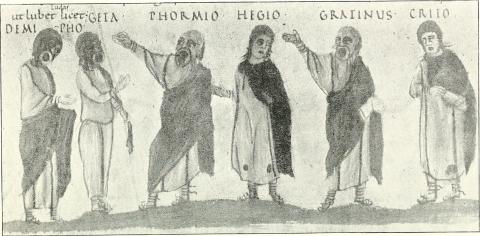Javal Coleman
June 20, 2022
In a discussion of the concept of the “good slave” in her book Reconstructing the Slave: The Image of the Slave in Ancient Greece, Kelly Wrenhaven rightly argues that “representations of good slaves are as much a part of the rationalizing ideology of slavery as bad slaves, as both help to justify and reinforce the institution.” Examining enslaved nurses depicted on Athenian tombstones, Wrenhaven points out that, out of a total of 15 extant tombstones for nurses, nine include the word chreste. Other inscriptions further confirm the association between the adjective chrestos and enslavement. On a 4th-century tombstone from Thasos, a shepherd named Manes is described as chrestos tais despotais (“useful to his masters”). Enslaved people are also described with this adjective in Menander as well as in Greek tragedy. What we get from considering the adjective chrestos in these and other contexts, as Wrenhaven makes clear, is that “the positive qualities most often attributed to slaves are precisely those which were most useful in the context of slavery.”
It is so-called “positive qualities” such as these that enslavers throughout history have used to reinforce their ideology of enslavement. This phenomenon is best understood as paternalism. In Roll, Jordan Roll: The World the Slaves Made (1973), Eugene Genovese analyzes the use of a paternalistic ideology that helped enslavers justify their vile institution. While this concept has been widely accepted as prevalent in the study of modern enslavement, it has not been as widely accepted in the study of ancient enslavement — though this is now changing to some degree.
In a recent article in Greece & Rome, Jason Porter examines the use of paternalistic ideology in the management of the enslaved as depicted in Homer’s Odyssey and Xenophon’s Oeconomicus. He demonstrates how enslavers attempted to reinforce their holding of flesh through rewarding so-called “good and loyal slaves,” and for punishing enslaved people who failed to live up to their owners’ standards or outright betrayed their owners (Odysseus’ treatment of the two groups of enslaved when he punishes the suitors is a good example of this dichotomy). As Porter has shown, paternalism is explicit in these texts.
I offer another example: in Demosthenes 36, For Phormion, the speaker is seeking to defend Phormion, who was formerly enslaved but, by this point, has become a fully enfranchised Athenian citizen. In doing so, the speaker characterizes both Phormion and his former owner Pasion (who himself had also been enslaved and later became a fully enfranchised Athenian citizen) in terms that specifically reinforce the ideology of the master class. Even though the aim was to show the goodness of their character, a closer reading shows that it also takes a paternalistic tone.
Concerning Apollodorus’ attack on Phormion’s wealth, the speaker says (36.43–44, Douglas M. MacDowell’s translation):
Pasion, your father, also acquired his wealth not by a windfall or by inheritance from his father, but he came to be trusted in the house of his masters, the bankers Antisthenes, and Archestratus, because he showed himself to be useful and just. To people working in commercial finance, it’s a marvelous thing for the same man to be found industrious and also to be honest. That wasn’t something passed on to Pasion by his masters; he was useful (or reliable) by his own doing. Likewise, your father didn’t pass it on to Phormion; he’d have preferred to make you honest, if it had been in his power! If you don’t understand that trustworthiness is the best of all foundations for making money, you won’t understand anything. Apart from that, Phormion has been useful in many ways to your father and to you and to your business in general.
We see in this passage that the characterization of Pasion and Phormion — not negative, by any means — is couched in the rhetoric of enslavement.
The speaker describes the fact that Pasion acquired wealth through being trustworthy to his former enslavers. He is depicted as being useful (chrestos) and just (dikaios) to the bankers that owned him. That Pasion was depicted as such may seem surprising, given the numerous references in ancient literature to enslaved people’s being thought of as dishonest, liars, and untrustworthy. But what does it mean for the speaker to characterize Pasion as chrestos and dikaios? Phormion is also described as being chrestos.
I argue that these descriptions of Pasion and Phormion reinforce the ideologies of the master class. In fact, Pasion and Phormion are described as being chrestos by their own doing. In a sense, this might imply that they were useful or reliable by nature. So, while these characteristics are what, according to the speaker, led to Pasion’s and Phormion’s obtainment of freedom and wealth, they could also be seen specifically as reinforcing the qualities of the so-called “good slave.” In other words, it was Pasion’s and Phormion’s usefulness to their enslavers that led to their freedom. Here, again, we see paternalistic ideology rear its head.
Paternalism, as I have outlined above, seems simple enough to identify. But what about in our modern discourse? Paternalistic ideology is very much alive and well.
When George Floyd was killed by Derek Chauvin on May 25, 2020, the world was rocked. Many who had not been paying attention to the systemic violence against my people finally woke up. With this wokeness, however, came numerous problematic responses to the events that transpired after Floyd’s death — namely, the worldwide protests that took place in response. News articles and stations frequently labeled these protests as “riots,” which actually served to underscore the reason that people were standing together in the streets in the first place.
Yet the labeling of these protests as “violent riots” is not surprising or unexpected.
What I found to be problematic however, is the paternalistic response of many white people. I had read, overheard, and argued with a series of people who spoke about the protestors and of Black people in general in terms which were perhaps not always ill-meaning, but problematic nonetheless. I had heard people say stuff along the lines of “well it was only a matter of time, they simply had enough, you can’t blame them.” Statements such as these are just as much a problem as calling my fellow Blacks riotous or violent or angry. As if my people are prone to violence and anger as part of our nature. This language reeks of privilege, the privilege of being able to watch on the sidelines as communities of color are harmed.
So where does paternalism come into play here? Promises to help out the poor Black community because they need assistance are still racism. Doing good by us because we are Black and under constant attack is still racism. It is still paternalism.
Pasion and Phormion, the formerly enslaved people in Demosthenes 36, were depicted as being freed because of their usefulness to their enslavers. They were supported and freed because they benefited the institution that directly supported their enslavers. Likewise, there is something askew when politicians and white people band together to help the poor Black. Something that supports and fuels both political campaigns and people’s morals.
But a significant distinction should be acknowledged: the physical appearance of the “good slave” of antiquity could vary, whereas today, one of the many afterlives of slavery in the Americas is a hyperfixation on helping out the “poor Black.” Saidiya Hartman, in Lose Your Mother, encapsulates this point:
If slavery persists as an issue in the political life of black America, it is not because of an antiquarian obsession with bygone days or the burden of a too-long memory, but because black lives are still imperiled and devalued by a racial calculus and a political arithmetic that were entrenched centuries ago. This is the afterlife of slavery — skewed life chances, limited access to health and education, premature death, incarceration, and impoverishment. I, too, am the afterlife of slavery.
What we get from this is that paternalism has evolved over time and continually rears its head in various contexts. This is but one of the many legacies of slavery, both ancient and modern. Though ancient slavery is not typically viewed with paternalism in mind, its relevance and prevalence should both, by now, be clear. Hartman’s words, the idea that I am the afterlife of slavery, resonates with me heavily.
Header image: An illustration of the characters in Phormio from Morgan and Hickey's translation. Courtesy of Wikimedia Commons.
Authors


